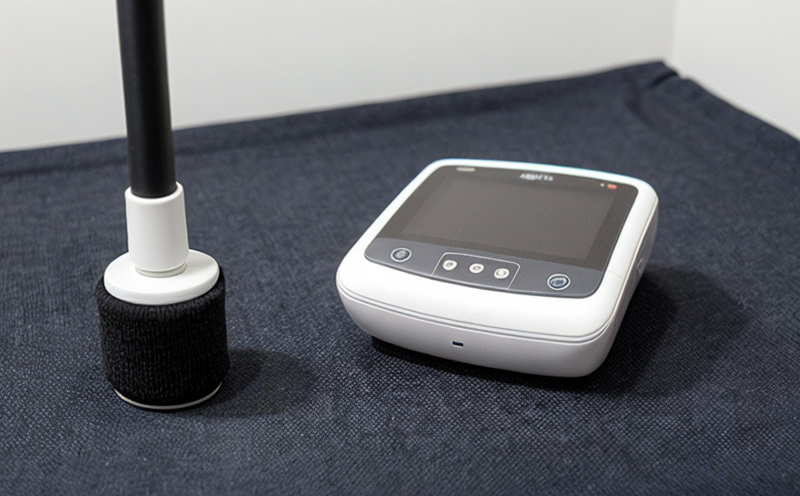EN 61340-4-9 Electrical resistance testing of flexible conductive materials
The International Electrotechnical Commission (IEC) Standard EN 61340-4-9 provides a method for the electrical resistance and surface resistivity measurement of flexible conductive materials. This standard is crucial in ensuring that materials used in electrostatic discharge (ESD) control programs meet safety requirements, particularly in environments where static electricity can pose significant risks.
The testing procedure outlined in EN 61340-4-9 involves several steps to ensure accurate and reliable results. The first step is the preparation of the specimen. This includes ensuring that the material is free from contaminants and that any surface coatings or treatments are stable and not affected by environmental factors. Specimens should be conditioned to a standard temperature and humidity level before testing.
The electrical resistance test typically involves placing the specimen on an insulating platform, connecting it to a suitable grounding point, and applying a constant voltage across the material. The current flowing through the material is measured simultaneously with the applied voltage, allowing for the calculation of both resistivity and surface resistance. This measurement helps determine whether the material meets the specified requirements.
The standard specifies several acceptance criteria that must be met to ensure compliance with EN 61340-4-9:
- Materials used in ESD control programs should have a surface resistivity of no less than \(1.0 \times 10^5\) ohms/square.
- The electrical resistance test should be conducted under controlled environmental conditions to ensure consistent results.
- Testing should be performed using appropriate equipment and techniques as specified in the standard.
Understanding these requirements is essential for quality managers, compliance officers, R&D engineers, and procurement teams who are responsible for ensuring that materials used in their products meet safety standards. This knowledge can help them make informed decisions about material selection and ensure product reliability.
The importance of EN 61340-4-9 cannot be overstated, especially in industries such as electronics manufacturing, semiconductor fabrication, and pharmaceuticals where static electricity can lead to significant operational issues or even safety hazards. By adhering to this standard, organizations can ensure that their products are safe for use and meet regulatory requirements.
For instance, in the electronics industry, flexible conductive materials used in circuit boards must be tested for electrical resistance to prevent short-circuits caused by static electricity. Similarly, in the pharmaceutical sector, ensuring proper grounding of equipment is critical to avoid contamination from electrostatic discharge. In these cases, testing according to EN 61340-4-9 ensures that products meet stringent safety standards.
Benefits
- Enhanced Safety: Ensures compliance with international safety standards and reduces the risk of electrostatic discharge incidents.
- Quality Assurance: Provides a reliable method for testing conductive materials, ensuring consistent performance across batches.
- Regulatory Compliance: Helps organizations meet regulatory requirements related to static control programs.
- Operational Efficiency: Minimizes downtime and production losses by preventing issues caused by electrostatic discharge.
Why Choose This Test
- Accurate Results: The testing method is precise, providing consistent results that can be relied upon for decision-making.
- Comprehensive Coverage: Covers a wide range of flexible conductive materials used in various industries.
- Expertise and Experience: Our team has extensive experience in conducting EN 61340-4-9 tests, ensuring accurate and timely results.
- Custom Solutions: We offer tailored testing solutions to meet the specific needs of different clients and industries.
The benefits of choosing our laboratory for EN 61340-4-9 electrical resistance testing are numerous. Our state-of-the-art facilities, combined with experienced professionals, ensure that you receive accurate, reliable results every time. Whether you're a quality manager looking to enhance safety in your workplace or an R&D engineer seeking precise data for product development, we have the expertise and resources to meet your needs.
Quality and Reliability Assurance
In addition to conducting EN 61340-4-9 tests, our laboratory offers a comprehensive suite of quality assurance services. We ensure that all materials used in electrostatic discharge control programs comply with international standards. Our team of experts uses the latest equipment and techniques to provide accurate results, ensuring that you can trust the data we produce.
We offer a range of additional services to support your compliance efforts, including:
- Training sessions for staff on ESD principles and best practices.
- Development of custom testing protocols tailored to specific client requirements.
- Continuous monitoring and reporting on the performance of conductive materials over time.
By partnering with us, you can rest assured that your products meet all relevant standards and regulations. Our commitment to quality and reliability is unmatched, ensuring that your business remains compliant and competitive in a constantly evolving market.





